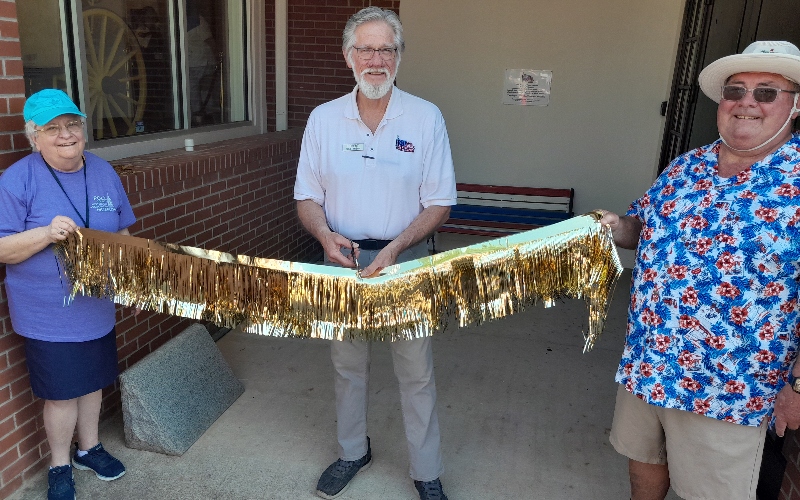Columbus now willing to cooperate with county on water/sewer lines
Published 12:47 pm Monday, June 30, 2008
After meeting together for years to discuss plans for water supply but then abruptly stopping, Columbus and Polk County appear ready again to consider cooperative efforts.
Columbus Town Council held a special meeting Tuesday to break a tie vote from last week concerning a proposed sewer line to Mill Spring. Polk County Manager Ryan Whitson and county board chairman Tommy Melton attended the meeting and discussed the need to cooperate and avoid duplicating services in Mill Spring.
&dquo;Open and public communication is needed and is necessary between the county seat and the county,&dquo; Whitson said. &dquo;I hope that this is the beginning of an increased dialogue between us.&dquo;
Columbus previously decided to seek a grant to extend water lines to Mill Spring, even though the county was running lines to the same area. Town officials reasoned it made sense to also seek a grant for a sewer line extension since customers in Mill Spring have indicated they want both water and sewer services.
But town officials recently have said it may not be wise for Columbus to extend water and sewer lines there if they only will be duplicating services provided by the county. The county has proceeded in recent months with construction of a water line from the county&squo;s recreation complex to the crossroads of Hwys. 9 and 108. The county has indicated it plans to also extend sewer to the Mill Spring area.
Columbus officials said this week they may prefer to extend lines to connect to the county in Mill Spring, but not to duplicate services and compete for customers.
Some Columbus council members said that especially in a time of drought and recent growth, Columbus wants all the backup options for water resources available and should be talking to the county, which recently secured Lake Adger as a long-term future water source.
&dquo;Somehow we&squo;re going to have to work with the county to hook their water line to our water line,&dquo; said Ricky McCallister. &dquo;With their (Polk County&squo;s water) line in the ground, it would be foolish to run lines beside it.&dquo;
Council members Margaret Metcalf and Michael Gage added they have issues with the town&squo;s policy that requires customers hooking up to sewer to sign a consent to future annexation by the town.
&dquo;The further out we go, the more customers we get and the more I feel like we&squo;re not protecting what we&squo;re supposed to,&dquo; Metcalf said. &dquo;I think we&squo;d be extremely foolish at this point to go any further. I feel like we&squo;re doing Columbus an injustice.&dquo;
Citizen concerns
Citizens attending the special meeting all spoke against the town applying for the grant.
&bsp;Susan Johann said Columbus people have been talking to her about their concerns that the town is taking on too much debt for projects outside Columbus. Robbie Price asked council why it would want to run sewer lines to Mill Spring when just a few weeks ago a consultant talked to council about Columbus&squo; sewer plant needing upgrades and the option of merging sewer plants with Tryon.
&dquo;We have a lot of projects in the middle of town that need doing,&dquo; Johann said. &dquo;We should spend money on people we have, not on people that are not here yet.&dquo;
The town arranged Tuesday&squo;s special meeting after a vote on the sewer line grant failed last week with a 2-2 tie. Gage and Metcalf voted against the motion, while Richard Hall and Ricky McCallister were for it. The mayor was not available to break the tie.
On Tuesday the vote never got to the mayor since no one made a motion to apply for the sewer line grant.
Hall said a lot has changed since the town applied for the water line grant last November and his mind was changed since last Thursday on the sewer option.
&dquo;I&squo;ve changed my mind since the other night because I&squo;ve been contacted by citizens who didn&squo;t want us to do this,&dquo; Hall said. &dquo;A lot has changed since November and that&squo;s why I am where I am.&dquo;
Connection
less costly
Columbus was looking at a $2,033,510 project to run both water and sewer to Mill Spring. The rural center grants for both projects could have yielded $1 million with Columbus financing the 50/50 match for an approximate $80,000 annual debt service payment. After Tuesday night&squo;s meeting, though, those costs could be cut in half or more, depending on negotiations with the county and how far Columbus will run water lines.
The water project is estimated at $833,250 for lines all the way to Mill Spring with other figures for design, permitting, bidding, easements and other legal and administrative costs. Columbus has already paid $57,700 to McGill & Associates for engineering services for the project.
Whitson said he&squo;d be glad to sit down with the town and work out a location to connect the county and town systems.&bsp; He said at one time the county had offered to Columbus four options of connecting the systems, but now that so much has changed, those options may not be available any longer. Previously, Whitson said the county offered to hook up to Columbus at Foster Creek, a proposed subdivision off Houston Road. Another option was to hook up at Wolverine Trail (Polk County Middle School) and another was for the county to run lines all the way to the high school or somewhere in between.
Whitson noted that a lot has changed since Columbus decided last year to apply for a grant to run water lines to Mill Spring, The county&squo;s decision to purchase Lake Adger, which can supply
8 million gallons of water per day, provides a long-term water sources for the whole county. He added that the county is&bsp; working on an agreement to allow Broad River Water Authority to run a water line through Green Creek to supply the Inman/Campobello Water District. In exchange Broad River has agreed to let Polk purchase up to 500,000 gallons per day, providing the county another back-up supply.
Relationships strained
Melton said the county and towns began meeting six years ago to protect the water in Polk County and he&squo;s never lost that objective.
&dquo;I&squo;d say within three to five years we&squo;ll be able to move water from Lake Adger,&dquo; Melton said. &dquo;We are going to move water through Polk County. If the towns want to come to us and renegotiate, I&squo;ll encourage my board to do that.&dquo;
Melton also said the county is going ahead with its water plans with or without the towns.
&dquo;Our relationships right now are strained,&dquo; said Melton. &dquo;Extremely.&dquo;
Columbus Town Manager Tim Holloman said he doesn&squo;t see where the county and Columbus are at odds concerning the grants. He said with funding, Columbus could have something to bring to the table in talking with the county and that Columbus could be a customer of Polk County.
Polk County and the towns of Tryon, Columbus and Saluda began meeting jointly on water in 2003. The county and towns&bsp; agreed to jointly pay for an engineering study, but when it came time last year to form a water authority, the towns decided to pursue other options. &bsp;
Town officials said they couldn&squo;t make the commitment needed by the county and indicated they wanted to maintain control of their water systems. The towns rejected the county&squo;s offer to pay for a line connecting Tryon and Saluda and instead pursued an emergency state grant for the project themselves.
Polk commissioners have said they never wanted to control water in the county, noting that the water authority board it proposed would have had six members from the towns and three from the county.
Even though the county failed to gain the cooperation of the towns, county commissioners have continued to make their work on a long-term water source a top priority. The county has proceeded with its application to reclassify the Green River for public water use and is moving forward with plans for a treatment plant and distribution system. The state does not allow water suppliers to secure a water source but not use it. Once the reclassification is approved, the county is required to create a water system, which it plans to develop gradually in stages.





